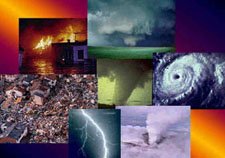The Disasters Roundtable of the National Academies invites you to join us as we participate in the "Understanding Risk" Conference June 1-6, 2010 at The World Bank 1818 H Street, NW - Washington, D.C. 20433 - and encourage you to engage in our live, online discussion now (see further information below) -
What is risk? Can we measure it? If we understand it, can we manage it better?
These are the fundamental questions the Understanding Risk community seeks to address and discuss in an online community forum - and we invite you to join us.
This forum is designed to bring together a diverse community of experts and practitioners to engage in an online discussion on various topics concerning innovation in disaster risk assessment.
The discussion threads generated in the online forum will determine the content of live sessions that will take place at the Understanding Risk Conference on June 1-6, 2010 at The World Bank in Washington D.C.
The Disasters Roundtable's leadership is coordinating a conference session and online discussion that is focused on:
Making Ends Meet: How can technological innovations in risk identification and risk assessment help communities be more resilient to disasters?
Background: Today, text messages, tweets, iphone apps, and facebook updates, not to mention 24-hour cable news cycles and countless other mechanisms, deliver information to people in the critical times during and after a disaster occurs. Twenty-first century technology allows for disaster-related risks to be identified, assessed, and communicated through satellites, the internet, and mobile devices. These technological innovations in risk identification and risk assessment advance the rate, quantity, and maybe even the quality of information that is transmitted and received during times of disasters. The question that this session, Making Ends Meet, poses is, "so what?"
For decades, scientists have investigated how people behave when they receive information about how they may be at risk.
Questions we want to address: Some older technologies did not trigger changes in human behavior, so how can we understand how the new, 21st-century technologies may have a different, more positive effect? The overarching questions posed for this session are whether these 21st-century technologies are or will be the game changers they promise to be and what is needed to translate these risk assessment technologies into behavior that increases the resilience of communities and reduces human suffering and loss of life during disasters. We, at the Disasters Roundtable of the National Academy of Sciences, welcome and encourage you to join us (now) in this live, online discussion and share your ideas for how to facilitate, mobilize, and implement ways to make ends meet between the 21st-century technologies for risk identification and risk assessment and the timeless desires of communities to be resilient to disasters.
To join the Disasters Roundtable's online discussion, please use one of the following links:
http://community.understandrisk.org/group/makingendsmeethowcancommunitiesuseriskassessmentre http://community.understandrisk.org/group/makingendsmeethowcancommunitiesuseriskassessmentre?xgi=2uLtyb80M7bx50&xg_source=msg_invite_group
To register for the conference "Understanding Risk" (June 1-6, 2010) at The World Bank, please use the following link: http://community.understandrisk.org/page/register-2
About the Disasters Roundtable
WHAT WE DO
The Disasters Roundtable (DR), a unit of the Division on Earth and Life Studies (DELS), works to facilitate knowledge and idea exchange through a range of activities:
WORKSHOPS
Roundtable workshops are held two or three times a year and focus on a specific topic or issue selected by Disasters Roundtable members. Workshops cover a range of specific topics, but typically come under one of six broad themes (see inset below).
LISTENING SESSIONS
The Disasters Roundtable holds periodic "Listening Sessions" with its constituents in the disasters community to ensure that the work of the Roundtable remains pertinent to the community it aims to serve.
PARTNERSHIPS AND COLLABORATIONS
The Disasters Roundtable coordinates with other groups or organizations, such as the World Bank, to host and plan events of interest to the disasters community.
Disasters Roundtable Workshops
COMMON THEMES
CLIMATE AND NATURAL HAZARDS
Workshops focus on disasters caused by extreme weather events and shifts in climate, such as hurricanes, rising sea levels and coastal erosion, flooding, and wildfires.
GEOLOGICAL HAZARDS
Workshops focus on disasters such as earthquakes and tsunamis. How can we build communities to reduce the risks posed by these geologic threats?
PUBLIC HEALTH AND BIOHAZARDS
Workshops focus on risk and planning for pandemics or other public health related disasters.
PLANNING AND PREPAREDNESS
Workshops focus on pre-disaster phases and activites. How can communities, states, and the nation develop effective methods of mitigating disaster impacts and responding quickly when disasters occur?
RESILIENCE AND RECOVERY
Workshops focus on recovering and learning from disasters. How can we rebuild and develop resilient communities to better weather the next disaster event?
SOCIAL ASPECTS OF DISASTERS MANAGEMENT
Workshops focus on research and strategies for community level disasters management.
Past workshop summaries may be found online at: http://dels.nas.edu/dr/reports.php
Contact the Disasters Roundtable:
500 5th Street NW, Washington, DC 20001
Phone: 202-334-3812
Email: dr@nas.edu
www.nas.edu/disasters
Thursday, April 22, 2010
Subscribe to:
Post Comments (Atom)


No comments:
Post a Comment